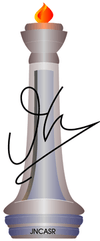Jawaharlal Nehru Centre for Advanced Scientific Research
 | |
| Type | Autonomous government institute (deemed university) |
|---|---|
| Established | 1989 |
Academic staff | ~50 |
| Students | ~300 |
| Address | JNCASR, Jakkur, Bangalore-560 064, Bangalore, Karnataka, India |
| Website | www.jncasr.ac.in |
The Jawaharlal Nehru Centre for Advanced Scientific Research (JNCASR) is a multidisciplinary research institute. It was established by the Department of Science and Technology of the Government of India, to mark the birth centenary of Pandit Jawaharlal Nehru. It is located in Jakkur, Bangalore, India. Its mandate is to pursue and promote scientific research and training at the frontiers of science and engineering. At present Prof. M. R. S. Rao[1] is the president of JNCASR and Prof. C. N. R. Rao is the honorary president and founder of the institute.
Academics
Researchers at the centre are divided into seven units: Chemistry and Physics of Materials, Engineering Mechanics, Evolutionary and Organismal Biology, Molecular biology and Genetics, New Chemistry, Theoretical Sciences, Educational Technology and Geodynamics.[2] There are two off-campus units: Chemical Biology and Condensed Matter Theory.
JNCASR has a faculty-to-student ratio of about 1:4 and state-of-the-art experimental, computational and infrastructural facilities. It offers Ph.D. programmes, as well as an Integrated Ph.D. (post-bachelor's degree) programme in Materials Science. It is a "deemed university", i.e., it awards its own degrees.
Apart from training its own students through a wide spectrum of courses, JNCASR actively supports a range of education outreach activities. For example, every year the centre's Summer Research Fellowship programme hosts some of the very brightest undergraduates in the country; the Educational Technology Unit produces a range of teaching aids and educational material; the centre also organises and teaches short-term courses at universities across India; and promising young chemists and biologists are trained intensively as part of the programmes of Project-Oriented-Chemical-Education (POCE) and Project-Oriented-Biological-Education (POBE).
Collaboration and research
The small size of the institute (currently about 53 faculty members and ~300 students) has many advantages. It fosters interdisciplinary collaborations that might not have sprung up at larger institutions where researchers are segregated in far-flung labs.
Amongst the many such on-campus collaborations that have sprung up over the years: a fluid dynamicist has joined forces with a statistical mechanician to look at flow in nanochannels with an experimental physicist to study the freezing of laser-induced metal droplets when they impinge on a substrate; a theoretical molecular-dynamics study of the arrangement of water molecules around a protein has emerged from coffee-table discussions between a biochemist and physicist; and a many-body theorist is modelling the devices developed in the molecular electronics lab.
In the last few years, the centre's faculty members have published their research in some of the most prestigious scientific journals, including Nature, Nature Medicine, Science, Evolution, the Journal of the American Chemical Society, Angewandte Chemie, the Journal of Fluid Mechanics, and Physical Review Letters. JNCASR contributes about 200 journal paper a year.
The work of the centre's faculty has been recognized by awards. The list of honours and prizes received by C.N.R. Rao runs into many pages. To list just a few of the awards gained by other faculty members: In 2006, Tapas K Kundu was awarded the Shanti Swarup Bhatnagar Award for biological sciences, Anuranjan Anand received the Outstanding Research Award from the Department of Atomic Energy (India), and Srikanth Sastry, GU Kulkarni and S. Balasubramanian received the B M Birla Science Prize. In 2007 Rama Govindarajan was one of the recipient of Shanti Swarup Bhatnagar Award.
The institute has received 12 patents from various countries as of November 2013. It is recognized as highest impact institution based on Science Citation Index for 2010-11.[3]
As on March 2014, the institute is planning to have a Supercomputer for Materials research, Forensic engineering and Failure analysis.[4]
Campus
The architecturally innovative buildings on the campus blend inobtrusively into several acres of lush landscape, with only the buckyball dome (designed by Charles Correa) rising above the treetops.
The institute has a HIV research lab dedicated to the study of Subtype C and it's global dominance. The HIV laboratory is headed by Prof. Udaykumar Ranga.[2]
References
- ↑ "Prof. M.R.S. Rao, President, JNCASR, Bangalore".
- 1 2 "JNCASR made huge impact on Science: Rao". Indian Express. Bangalore, India. 9 November 2013.
- ↑ "At 25, JNCASR has the 'highest impact'". The Hindu. Bangalore, India. 9 November 2013.
- ↑ "JNCASR to have fastest supercomputer in materials science". Deccan Herald. Bangalore, India. 3 March 2014.
| Wikimedia Commons has media related to Jawaharlal Nehru Centre for Advanced Scientific Research. |